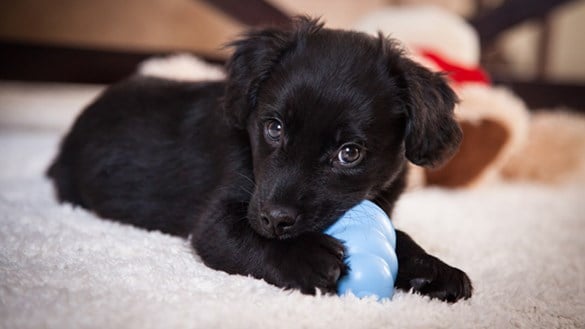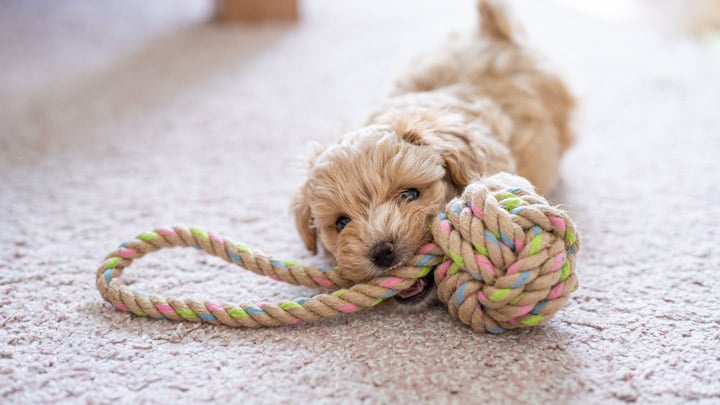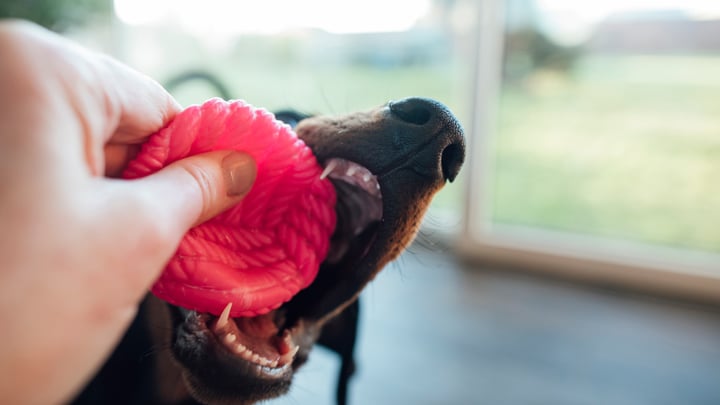How To Cope With Puppy Biting
When your puppy gazes up at you with their big eyes and playfully nibbles on your hand it can seem utterly adorable. However, when they are young puppies have razor sharp teeth, so when the nibble progresses because they’re excited – it hurts a lot! It’s normal for puppies to mouth and bite, if you don’t control their behaviour from the outset you could be storing up bigger problems for later on.

Thankfully, most puppies grow out of the habit naturally, usually within three to five months. Even if they don’t, it’s possible to train your puppy not to bite, or at least to only bite the things you want them to.
Why do puppies bite?
Puppies love exploring, discovering new textures and smells, and naturally they use their mouth to do so. They learn through play with their mum and siblings that soft bites and mouthing are welcome while hard nips are less so.
They may bite when they’re over excited, bored or tired and sometimes simply because you’re leaving the house and they’re experiencing separation anxiety.
Teething is another reason you might notice them chewing and biting more as they seek to reduce the pain and discomfort of their adult teeth coming through. It can be a tricky time for you and your puppy, but thankfully it doesn’t last forever - by six months most puppies have their adult teeth.
Generally, a puppy that has been handled since birth and shown plenty of attention shouldn’t bite much because they will feel safe and cared for. If there was no handling, too much rough play or neglect then biting might become a feature.

How do I stop my puppy biting?
Above all, you don’t want to make a big deal out of biting because otherwise your puppy might associate it with a way of getting your attention. But if you find it’s getting out of hand, then it’s time tackle it before any serious damage is done.
- No skin biting – This is a rule you should stick to from the moment you welcome your puppy into your home. It may seem cute and harmless when they’re little even if there’s no aggression involved, but it can become ingrained and a bite with adult teeth can be a lot more painful
- Don’t react – It’s hard but try not to react when your puppy bites. Don’t squeal or pull away because they’ll think it’s a big game. Instead stand still, avoid any eye contact, and move away from them so they know biting means an end to playtime
- Distraction – Every time they bite offer them a chew toy and encourage them to play with that instead. Redirection is far more effective than punishment
- Remove temptation – If there are possessions you really treasure, then it’s best to just keep them out the way while your puppy goes through the biting stage. Try not to wear flappy clothes that attract their attention and keep long hair tied back
- No rough games – Puppies love a bit of rough and tumble, and it’s vital for socialisation, but too much of it can lead to them thinking biting is acceptable behaviour. Keep the rough and tumble for when they’re playing with their puppy friends
- Handling and grooming – Spending lots of time with your pup, handling them regularly and grooming their fur can get them used to human touch and make them feel secure
- Children – Kids mean well but can easily overstimulate an already excitable pup. Encourage children to play gently with your puppy, tell them not to pull their tail or ears, or tease them with a toy or food
- Separation anxiety – If your puppy bites when you go out, they may be experiencing separation anxiety and you’ll need to wean them off your constant presence. Put them in a safe room with their toys and basket, try and keep the environment calm and make sure they’ve been to the toilet and had a run around, so they’ll be ready to rest. If necessary, start with short trips before building up to longer ones
- Reward good behaviour - Don’t punish your puppy for biting but praise them when they get things right. Gentle, positive reinforcement encourages your puppy to do the things you want them to do and for those actions to be their default behaviour as they grow
- Enlist the family - If good behaviour is to become the norm it’s important all family members are on board. Make sure you let them know how they should behave and any action you want them to take to reinforce what you’re trying to teach

Fortunately, puppy biting is a short-lived phase, albeit a painful one. With some gentle direction from you, your puppy will soon learn the best games are gentle and bite-free ones.

